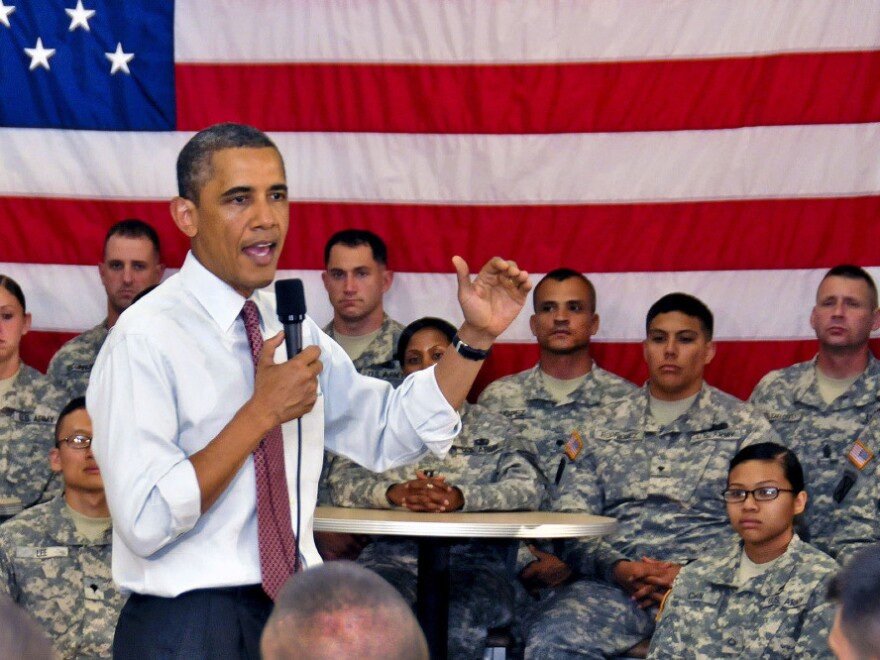Peter Feaver is the director of the Triangle Institute for Security Studies and the Duke Program in American Grand Strategy. He was special advisor for strategic planning and institutional reform on the National Security Council staff at the White House from 2005-2007.
Because of a day in air travel purgatory, I have been unable to comment on President Barack Obama's Afghanistan decision and his rare prime-time address on war. With the "benefit" of an additional day of musing and reading other people's commentary, I have three somewhat contradictory takes. First, it seems clear that he is putting the country on an extraordinarily risky course, one that could jeopardize much of the gains achieved by his West Point surge. Second, he has not presented to the country a sound strategic rationale for why he is doing it this way, leaving the obvious alternative — that this decision was driven by his electoral interests rather than the best national security interests of the country — a more plausible explanation than it should otherwise be. But third, at least from the parochial perspective of civil-military relations theory, Obama is within his rights to make the decision in the way that he did, and so far, the senior military have behaved in an exemplary fashion.
The first point has been made well by my Shadow Gov colleague, Kori Schake. As was the case with his West Point surge, the president has hobbled the kinetic leg of his strategy with the self-inflicted diplomatic/political wound of signaling lack of resolve. As a result, not only will the coalition have fewer forces than the generals believe they require to implement the overall strategy effectively — probably much fewer, as our allies respond to the dog whistle "retreat" sounding from the president's decision and accelerate their rush to the exits — but those forces will be facing an enemy that has good reason to believe that time is on its side. The military brass report that the new course just might work, but it will be a very close run thing.
The second point has also been made by others. Since the military logic of the move is so weak, one naturally looks for some other explanation, such as a political angle. The president's decision to interrupt next summer's fighting season makes no military sense whatsoever; better to let the troops finish the fighting season and come home in the late fall or winter. But that would be after the election. So far as I have been able to determine, that is the only explanation of the timeline that makes sense, but I am open to hearing a convincing counterargument. I am very reluctant to charge a president with elevating domestic political interests over national security ones because I remember how unfairly Democrats made that charge against President George W. Bush — and that was on a much more flimsy evidentiary basis. Yet, when I look for a more compelling alternative explanation, I can't find one. Certainly not in the speech, which, as Dov Zakheim pointed out, was strategically incoherent. Given how rarely he has spoken about Afghanistan, it is unfortunate that he squandered this rhetorical moment.
Yet there is one aspect of the decision that is legitimate and one that may even warrant praise. The legitimate aspect is that, notwithstanding a torrent of leaks, the decision-making process seems to have conformed more or less to democratic civil-military norms. The military presented a range of options, including options that it did not want to execute; it would have been inappropriate of Gen. David Petraeus to tie Obama's hands by only providing a narrow range of options, minor variants of the military's preferred plan. He didn't do so; instead, he and the rest of the military leadership have saluted and are obeying, and such professionalism is very definitely worthy of praise. To be sure, the military gave its best personal judgment as to the risks inherent in those plans. Obama was fully aware of the military's judgment, and the public, through Congress, is also aware of that judgment. But it is the president's job to balance the risks of battlefield failure against other risks. The military gets to say this is a high-risk plan. The president gets to say that he will accept this risk and impose it on them.
Accept it and impose it he did. That has important political consequences. Before, one could say that he merely chose General Stanley McChrystal and General Petraeus's strategy. Now it is unmistakably President Obama's strategy. It is his war. But he will be ordering others to fight his war, which brings me to one bit of unfinished civil-military business.
While the media attention has been focused on the troops that are leaving Afghanistan in the coming months, I have been thinking of the troops that will remain. They are locked in the fight of their lives, and they (or at least their commanders) probably paid more attention to the president's speech than did most other Americans. Did the president give them a convincing rationale for continuing to risk their lives? Did he convince them that the stakes were worth it, that the prospects for lasting success good enough? Do they believe that their commander in chief is as committed to the war effort as he is asking them to be? Only when those answers are answered satisfactorily will Obama have fulfilled the dictates of democratic civil-military theory.
Even then, however, he still may be wrong on the strategic aspects of his decision. From a civil-military perspective, the president has the right to be wrong. He might well be wrong this time, and if so, that may be evident to all by next fall. In that case, democratic theory points to the duty of others: the voters.
Copyright 2020 Foreign Policy. To see more, visit . 9(MDAxNDQ2NDAxMDEyNzU2NzM2ODA3ZGI1ZA001))


